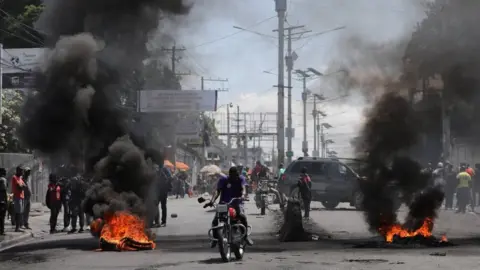Haiti's main port closes as gang violence spirals
 Reuters
ReutersHaiti's main port says it is suspending operations due to sabotage and vandalism as the capital city descends further into violence and chaos.
Local media report that armed men broke into the port in capital Port-au-Prince, looting containers.
It follows attacks by gangs on the airport, police stations and prisons this week. They are pushing for Haitian Prime Minister Ariel Henry's removal.
A three-day state of emergency has now been extended by a month.
Caribbean Port Services, the operator of the port, cited "malicious acts of sabotage and vandalism" as it announced the decision to suspend all services.
More than 20 trucks carrying vital equipment, medical supplies and food are stuck at the port, according to the UN's World Food Programme, which said it had suspended its maritime transport service, citing "insecurity".
The UN humanitarian affairs agency has warned that the country's health system is "nearing collapse".
US Secretary of State Antony Blinken spoke to Mr Henry to ask for an "urgent" political transition, a senior US official said.
Mr Blinken spoke with the Haitian prime minister about "the urgent need to accelerate transition to a broader, more inclusive government today," Brian Nichols, US assistant secretary of state for Western Hemisphere Affairs, said at an event on Thursday.
The gangs in the violence-wracked city stepped up their attacks when Mr Henry left for a regional summit last week.
Mr Henry attempted to fly back to Port-au-Prince on Tuesday but ended up in the US territory of Puerto Rico instead.
He could not land in the Haitian capital because its international airport was closed as soldiers repelled attempts by gunmen to seize it.
Civil aviation authorities in the neighbouring Dominican Republic also turned the prime minister's plane away, saying that they had not been provided with the necessary flight plan.
Mr Henry has not given any public statements since he visited Kenya, where he met President William Ruto to salvage a deal for the east African country to lead a multi-national force to help restore order in Haiti.
The two leaders signed a reciprocal agreement which paves the way for 2,000 Kenyan police officers to be sent to Haiti but a Kenyan opposition politician says he will challenge the deal in court.
Meanwhile, several Kenyan police officers who had volunteered for the deployment have opted out for their safety.
Gangs in Port-au-Prince have taken advantage of Prime Minister Ariel Henry's absence to unleash a series of co-ordinated attacks.
Among their targets was the airport - which they want to control to prevent Mr Henry from flying back in - and two prisons, from which they freed thousands of inmates.
At least six police officers have been killed while the National Police Academy has also been destroyed.
The bodies of several prisoners were also left lying on the streets after the storming of the National Penitentiary.
The violence has caused Haiti's humanitarian crisis to deteriorate even further.
Aid groups estimate that more than 15,000 people have fled their homes in the past week.
The gangs have not said what their aim is beyond the ouster of Mr Henry.
Jimmy "Barbecue" Chérizier, a former police officer who leads an alliance of gangs called G9, has threatened that if Mr Henry does not step down there will be a "civil war" which he said could end in "genocide".
Aid group Medecins Sans Frontieres estimates that at least 2,300 people were killed in the violence in 2023 in the Port-au-Prince neighbourhood of Cite Soleil alone, home to 9% of the capital's population.
